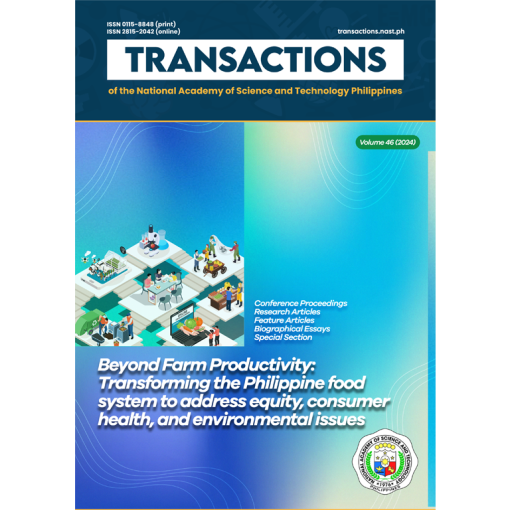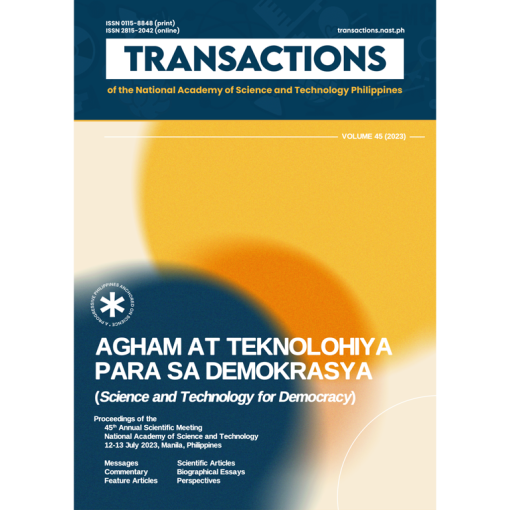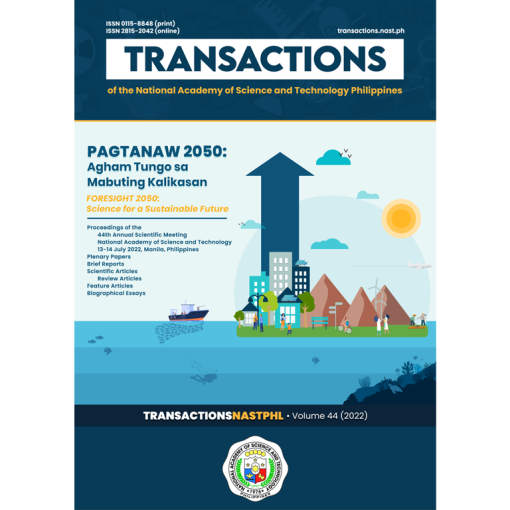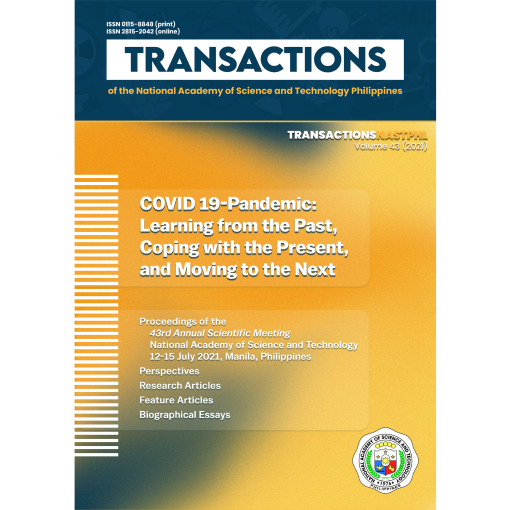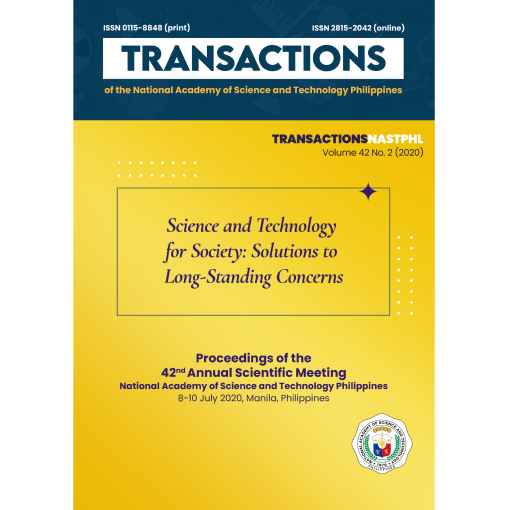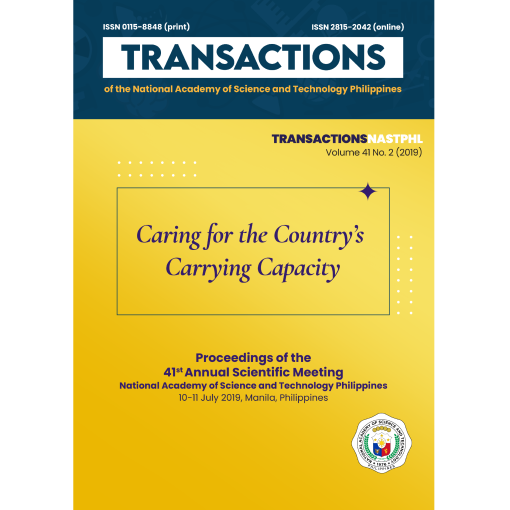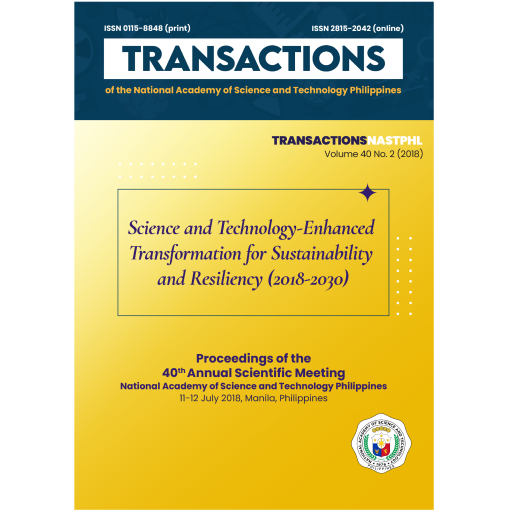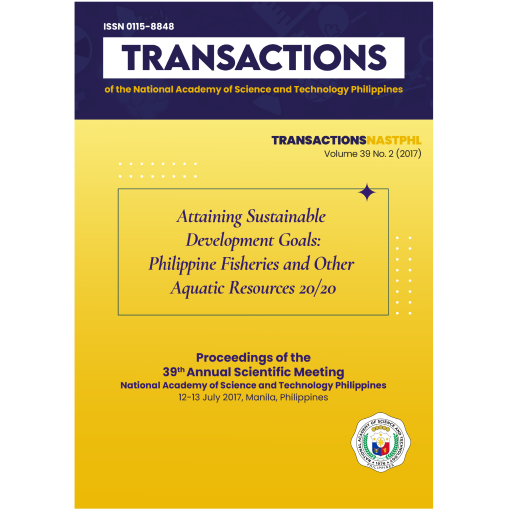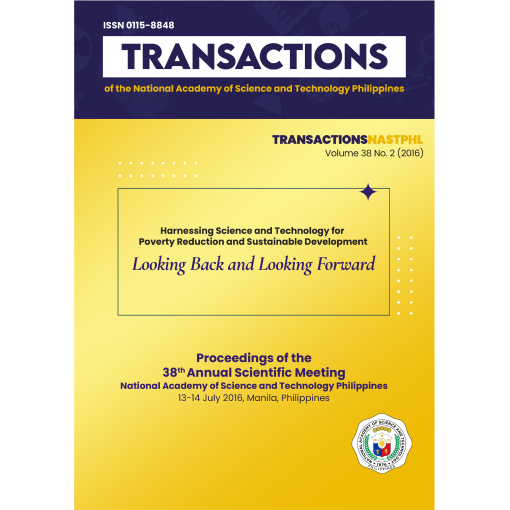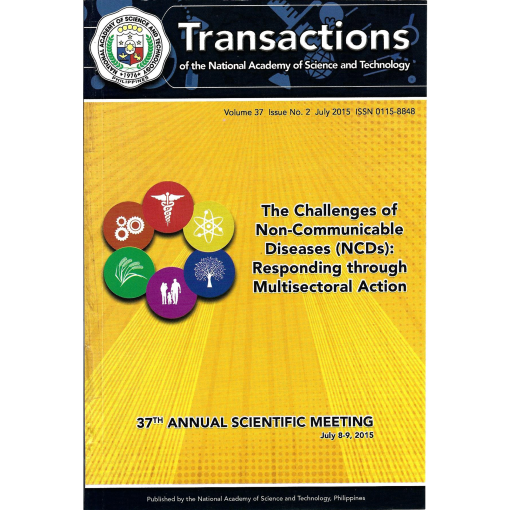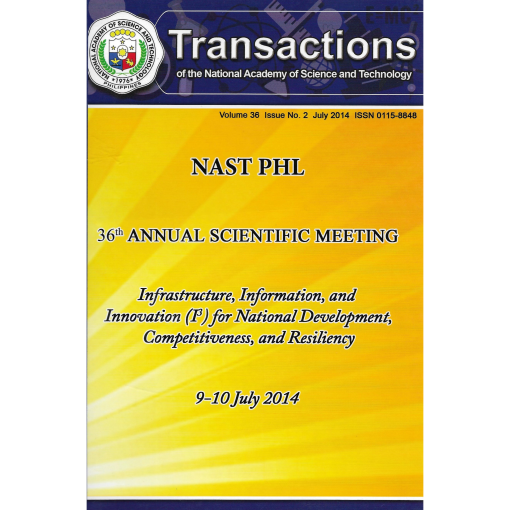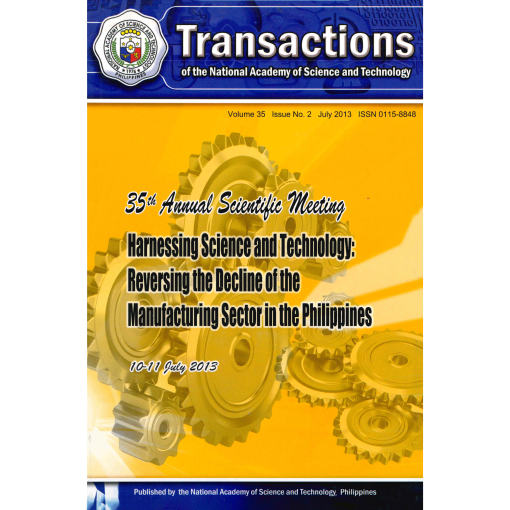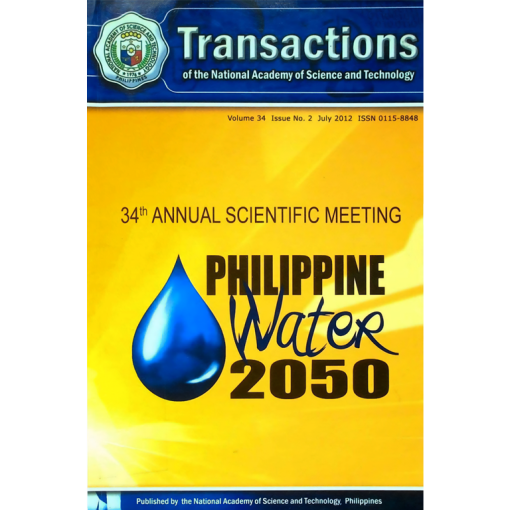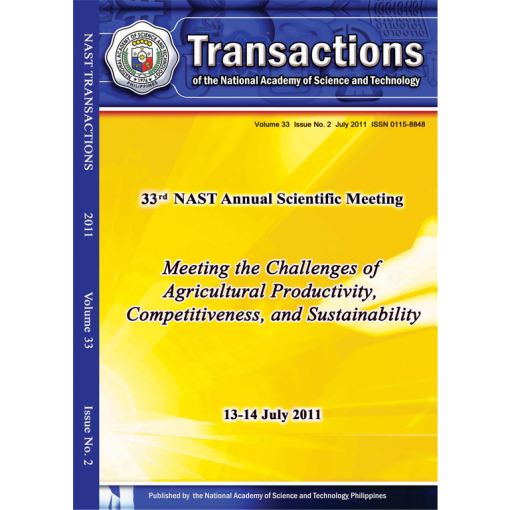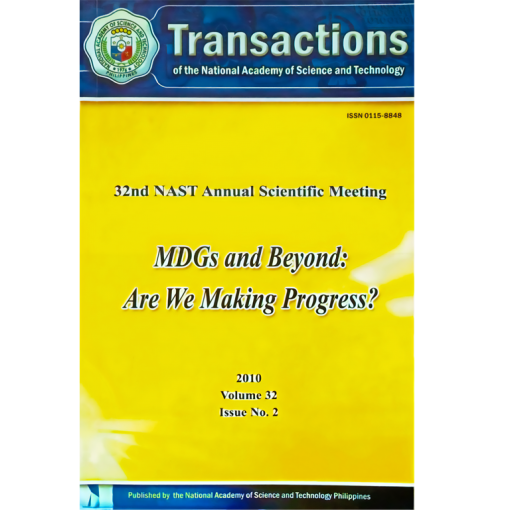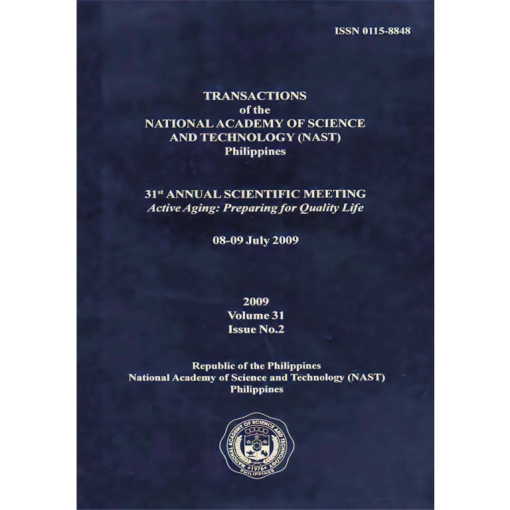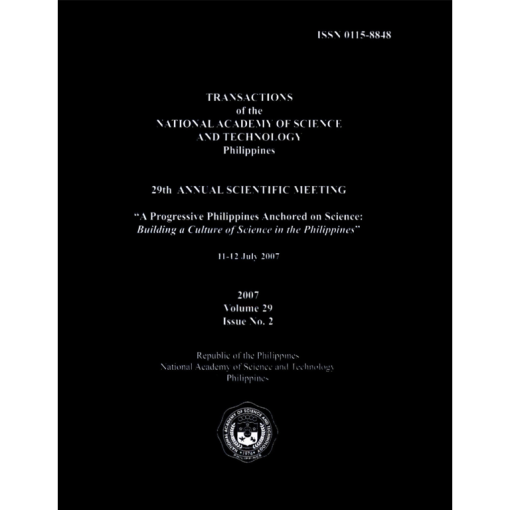For the 46th Annual Scientific Meeting (ASM) and the 2024 Regional Scientific Meetings, the NAST PHL adopted the theme “Beyond Farm Productivity: Transforming the Philippine Food System to Address Equity, Consumer Health, and Environmental Issues”.
Issues
For the 45th Annual Scientific Meeting (ASM) and 2023 Regional Scientific Meetings (RSM), the National Academy of Science and Technology Philippines (NAST PHL) adopted the theme: Agham at Teknolohiya para sa Demokrasya (Science and Technology for Democracy). This theme underscores the crucial role of science and technology in fostering developmental empowerment within a democracy, aiming to distinguish between exploitative and developmental empowerment and mitigate threats to democracy. The meetings serve as a platform to discuss how science and technology can enhance inclusion, welfare, and democratic processes. Examples include renewable energy technologies enabling decentralized power systems, mobile telephony empowering farmers, blockchain technology decentralizing trust, and electronic voting machines expediting election credibility. However, the proliferation of social media also poses risks, such as the spread of fake news, necessitating societal discussions and solutions.
For the 44th Annual Scientific Meeting (ASM) and 2022 Regional Scientific Meetings (RSM), the National Academy of Science and Technology Philippines (NAST PHL) adopted the theme: PAGTANAW 2050: Agham Tungo sa Mabuting Kinabukasan (FORESIGHT 2050: Science for a Sustainable Future). Science, technology, and innovation (STI) are recognized as crucial but insufficient elements in addressing societal challenges. DOST Secretary Fortunato T. de la Peña entrusted NAST PHL with developing a 30-year STI Foresight, known as PAGTANAW 2050, the first Philippine-focused plan anticipating factors influencing the country’s development. Aligned with the vision of a “Prosperous, Archipelagic, Maritime Nation,” PAGTANAW 2050 advocates for a globally competitive, knowledge-based, inclusive, and sustainable Philippine blue and circular economy. Drawing from constitutional aspirations, national plans, and global goals, the initiative aims to cultivate an educated, healthy, and productive citizenry. NAST PHL chose PAGTANAW 2050 as the central theme for its scientific meetings to raise awareness in the STI community and present recommendations for its implementation to relevant government agencies during the 44th ASM.
Starting with Volume 43 (2021) this journal is open to contributions from the global scientific community in all fields—agricultural sciences, biological sciences, engineering science and technology, health sciences, mathematical and physical sciences and social sciences. The types of papers this journal will publish include the following: plenary papers presented at NAST PHL Annual Scientific Meetings, perspectives/commentaries, original articles, review articles, feature articles, brief reports, and biographical essays of members of NAST PHL and other outstanding men and women of science. All contributed papers will be subjected to double-blind peer review.
For the 42nd Annual Scientific Meeting (ASM) and 2020 Regional Scientific Meetings (RSM), the National Academy of Science and Technology Philippines (NAST PHL) adopted the theme: Science and Technology for Society: Solutions to Long-Standing Concerns. This annual gathering serves as a forum that convenes stakeholders from various sectors to discuss important and timely national issues and concerns towards formation of policy recommendations and actions. The 42nd ASM, held from July 7-10, 2020, focused on pivotal societal challenges including (1) food system and health, (2) energy and water, (3) environment, climate change, and blue economy, (4) ICT, shelter, and other infrastructure, and (5) science education and talent retention as well as the learnings from the COVID-19 pandemic to formulate policies or implementing guidelines in providing solutions to our long-standing woes.
For the 41st Annual Scientific Meeting (ASM) and 2019 Regional Scientific Meetings (RSM), the National Academy of Science and Technology Philippines (NAST PHL) adopted the theme: Caring for the Country’s Carrying Capacity, focusing on key Sustainable Development Goals (SDGs) including quality education, responsible consumption and production, and life below water. Held on July 10-11, 2019, the ASM and RSMs convened stakeholders to address pressing national concerns such as plastic waste management, sustainable marine food security, and talent development, within the framework of carrying capacity defined as the sustainable supply of biological products and services from the natural environment.
For the 40th Annual Scientific Meeting (ASM) held on July 11–12, 2018, the National Academy of Science and Technology Philippines (NAST PHL) adopted the theme “Science and Technology-Enhanced Transformation for Sustainability and Resiliency (2018–2030).” The meeting reviewed the country’s performance on the Millennium Development Goals and initiatives toward achieving the Sustainable Development Goals (SDGs), particularly those on clean water and sanitation, affordable and clean energy, sustainable cities, responsible consumption and production, and life on land. It also underscored the importance of peace, justice, strong institutions, and partnerships in supporting these goals. The ASM aimed to provide policy recommendations and action plans to strengthen the Philippines’ efforts in fulfilling its SDG commitments through effective, participatory, and integrated approaches involving both government and the private sector.
For the 39th Annual Scientific Meeting (ASM) held on July 13–14, 2017, the National academy of Science and Technology Philippines (NAST PHL) adopted the theme: Sustainable Development Goals (SDGs) to be its overarching theme, with focus on SDG No. 14 Life below Water. The Philippines being an archipelago has more water than land. Thus, the country’s water resources should be adequately developed. Our seas are not only a source of food. They are a source of industrial raw materials, such as seaweeds and algae, and source of active ingredients of pharmaceutical products and cosmetics.
For the 38th Annual Scientific Meeting (ASM) held on July 13–14, 2015, the National Academy of Science and Technology Philippines (NAST PHL) adopted the theme “Looking Back and Looking Forward.” Serving as the country’s leading forum for scientific and policy research, the meeting reviewed past achievements and identified reforms and actions needed to address current national issues and concerns. Policy recommendations arising from the plenary sessions and discussions were submitted to the Philippine government and the private sector for consideration and implementation.
For the 37th Annual Scientific Meeting (ASM) held on July 8-9, 2015, the National academy of Science and Technology Philippines (NAST PHL) adopted the theme: The challenges of Non-Communicable Diseases (NCDs): Responding through Multisectoral Action.
For the 36th Annual Scientific Meeting (ASM), the National Academy of Science and Technology Philippines (NAST PHL) focused on the three “pillars” of competitiveness identified by the World Economic Forum: infrastructure, information, and innovation. Discussions centered on policy and governance issues in key infrastructure sectors such as energy, water, telecommunications, and transportation, with the goal of identifying concrete measures to improve the country’s performance. Serving as a premier forum for scientific and policy research, the ASM produced recommendations for both government and the private sector to support national competitiveness and development.
For the 35th Annual Scientific Meeting (ASM) and 2013 Regional Scientific Meetings (RSM), the National Academy of Science and Technology Philippines (NAST PHL) adopted the theme: Harnessing Science and Technology: Reversing the Decline of the Manufacturing Sector in the Philippines. The objective is to sensitize the manufacturing sector to improve productivity by using the latest knowledge, tools, and machinery in order to respond in a timely manner. The ASM, held on 10-11 July 2013, should also identify a technology-specific roadmap to revitalize the manufacturing sector by adding value to the inputs in the manufacturing process. The continuing decline in the productivity and viability of the local manufacturing sector has been the subject of much discussion and significant concern. Many observers attribute the decline to a combination of several factors, with access to and use of modern technology being a major concern for the science community.
For the 34th Annual Scientific Meeting (ASM) and 2012 Regional Scientific Meetings (RSM), the National Academy of Science and Technology Philippines (NAST PHL) adopted the theme: Philippine Water 2050. This gathering provided a platform to address pressing concerns regarding water scarcity and management in the Philippines. Despite the country’s seemingly abundant freshwater resources, challenges such as contamination, inadequate infrastructure, and population growth threaten water availability and quality. The ASM highlighted the need for comprehensive approaches to ensure access to safe water for domestic use, support food security, preserve ecosystems, mitigate disasters, and enhance energy security through sustainable hydropower generation
The Transactions of the National Academy of Science and Technology (ISSN 0115-8848) has been published by the National Academy of Science and Technology Philippines (NAST PHL) since 1979. Transactions NAST PHL has For the 33rd Annual Scientific Meeting (ASM) and 2011 Regional Scientific Meetings (RSM), the National Academy of Science and Technology Philippines (NAST PHL) adopted the theme: Meeting the Challenges of Agricultural Productivity, Competitiveness and Sustainability. This theme builds on the Philippine Agriculture 2020 strategy — addressing the stagnation in agriculture, declining GNP share, and persistent rural poverty.
For the 32nd Annual Scientific Meeting (ASM) held on 14-15 July 2010 and the 2010 Regional Scientific Meetings (RSM), the National Academy of Science and Technology Philippines (NAST PHL) chose the theme “MDGs and Beyond: Are We Making Progress?” The meeting focused on reviewing the country’s progress toward the Millennium Development Goals (MDGs) across various sectors, with the Academy’s members leading discussions on seven of the eight MDGs. Through roundtable discussions and plenary presentations, experts addressed key issues such as poverty, education, gender equality, health, environmental sustainability, and more. These discussions culminated in a set of policy recommendations and insights on how the Philippines can continue striving towards these crucial goals.
The 31st Annual Scientific Meeting (ASM) of the National Academy of Science and Technology Philippines (NAST PHL), held on 08-09 July 2009, centered on the theme “Active Aging: Preparing for Quality Life.”
The 30th Annual Scientific Meeting (ASM) of the National Academy of Science and Technology (NAST), held with the theme “Energy Security and Sustainability: Assessing the Present and Foreseeing the Future,” was organized by the Engineering Sciences and Technology Division under the leadership of Acd. Ceferino L. Follosco. Serving as a sequel to the 27th ASM on food security, the meeting underscored the interconnectedness of energy and food security in achieving national self-reliance and prosperity. The ASM convened the scientific community and key stakeholders to address issues in energy generation, utilization, and conservation, aiming to develop actionable resolutions and R&D programs for policymakers, the private sector, and the public. Four plenary sessions covered topics such as challenges in the energy sector, energy’s impact on health and food, and strategies for conservation and competitiveness, complemented by technical sessions on alternative energy sources like biofuels
For the 29th Annual Scientific Meeting (ASM) held on July 11-12, 2007, the National Academy of Science and Technology Philippines (NAST PHL) adopted the theme “A Progressive Philippines Anchored on Science: Building a Culture of Science in the Philippines.” Led by the Chemical, Mathematical, and Physical Sciences Division (CMPSD), the meeting explored strategies to foster a scientific culture, focusing on science education reforms, support for young talent, and strengthening research institutions. Six plenary sessions and concurrent technical sessions addressed challenges in science and mathematics education, culminating in divisional roadmaps for enhancing curriculum relevance to national needs. The ASM featured keynote speeches, poster presentations, and resolutions advocating legislative support for science and technology. Organized with the support of patrons, sponsors, and donors, the event emphasized collaboration to advance the country’s scientific capabilities.
For the 27th Annual Scientific Meeting (ASM) held on July 13-14, 2005, the National Academy of Science and Technology Philippines (NAST PHL) adopted the theme “Philippine Agriculture 2020: A Strategy for Food Security, Global Competitiveness, and Sustainability.” This meeting emphasized the critical role of agriculture in achieving national goals such as poverty alleviation, justice, and peace while addressing food security and sustainability. The event featured discussions and consultations on crafting a visionary roadmap, Philippine Agriculture 2020, aimed at guiding agricultural development. With insights from key stakeholders and support from various sectors, the ASM sought to develop actionable strategies to uplift lives through science and technology, driving progress toward the Millennium Development Goals. FRONT MATTER Editorial Staff (2006) Board of Editors (2006) Executive Council, NAST PHL (2006) About the TRANSACTIONS NAST PHL About the National Academy of Science and Technology PHL Table of Contents
For the 27th Annual Scientific Meeting (ASM) held on July 13-14, 2005, the National Academy of Science and Technology Philippines (NAST PHL) adopted the theme “Philippine Agriculture 2020: A Strategy for Food Security, Global Competitiveness, and Sustainability.” This meeting emphasized the critical role of agriculture in achieving national goals such as poverty alleviation, justice, and peace while addressing food security and sustainability. The event featured discussions and consultations on crafting a visionary roadmap, Philippine Agriculture 2020, aimed at guiding agricultural development. With insights from key stakeholders and support from various sectors, the ASM sought to develop actionable strategies to uplift lives through science and technology, driving progress toward the Millennium Development Goals. FRONT MATTER Editorial Staff (2005) Board of Editors (2005) Executive Council, NAST PHL (2005) About the TRANSACTIONS NAST PHL About the National Academy of Science and Technology PHL Table of Contents Executive Summary Plenary Papers
For the 26th Annual Scientific Meeting (ASM) held on July 14-15, 2004, at The Manila Hotel, the National Academy of Science and Technology Philippines (NAST PHL) adopted the theme “On Being and Becoming: Where We Are and Where We Want To Be.” This meeting provided a platform for stakeholders to reflect on the nation’s progress across various sectors, identify challenges, and envision strategies for a sustainable and prosperous future. Discussions emphasized the role of science and technology in addressing national issues and fostering development, highlighting the need for collaboration, innovation, and actionable solutions to achieve long-term goals. FRONT MATTER Editorial Staff (2004) Board of Editors (2004) Executive Council, NAST PHL (2004) About the TRANSACTIONS NAST PHL About the National Academy of Science and Technology PHL Table of Contents Plenary Papers
For the 25th Annual Scientific Meeting (ASM) held on July 14-15, 2003, at The Manila Hotel, the National Academy of Science and Technology Philippines (NAST PHL) focused on the theme “Addressing the Demographic Crisis in the Philippines.” The meeting brought together experts and stakeholders to discuss the challenges posed by demographic shifts and their implications for national development. Sessions highlighted the role of science and technology in crafting evidence-based policies and strategies to address population issues, emphasizing sustainable solutions to ensure a better quality of life for all Filipinos FRONT MATTER Editorial Staff (2003) Board of Editors (2003) Executive Council, NAST PHL (2003) About the TRANSACTIONS NAST PHL About the National Academy of Science and Technology PHL Table of Contents Plenary Papers
For the 24th Annual Scientific Meeting (ASM) held on July 10-11, 2002, at The Manila Hotel, the National Academy of Science and Technology Philippines (NAST PHL) adopted the theme “Enhancing Philippine Science and Technology through ICT.” This meeting emphasized the transformative potential of Information and Communication Technology (ICT) in breaking barriers to knowledge, participation, and economic opportunity, as highlighted by the United Nations Human Development Report 2001. Organized by the Engineering Sciences and Technology Division, discussions centered on ICT’s role in science, education, and global competitiveness, alongside its impacts on biotechnology and societal development. Through key lectures and technical papers, the ASM sought to provide science-based insights to policymakers and stakeholders, fostering national progress and improved welfare in the network age. FRONT MATTER Editorial Staff (2002) Board of Editors (2002) Executive Council, NAST PHL (2002) About the TRANSACTIONS NAST PHL About the National Academy of Science and Technology PHL Table of Contents Plenary Papers
For the 23rd Annual Scientific Meeting (ASM), held on July 11-12, 2001, at The Manila Hotel, the National Academy of Science and Technology Philippines (NAST PHL) adopted the theme “Science in the 21st Century.” The meeting explored the rapid advancements in science and technology and their potential to enhance human welfare while addressing critical challenges such as biotechnology, environmental sustainability, and the development of a responsive scientific community. Discussions emphasized the need for ethical and socially responsible science to ensure its benefits align with humanity’s needs, fostering national progress and global competitiveness. FRONT MATTER Editorial Staff (2001) Board of Editors (2001) Executive Council, NAST PHL (2001) About the TRANSACTIONS NAST PHL About the National Academy of Science and Technology PHL Table of Contents Plenary Papers
For the 22nd Annual Scientific Meeting (ASM) held in July 2000, the National Academy of Science and Technology Philippines (NAST PHL) adopted the theme “Challenges in the New Millennium for Science and Technology.” The meeting addressed five pressing concerns—environment and health, climate change, transportation and traffic management, information and communications technology (ICT), and biotechnology in agriculture. Recognizing the evolving role of science in a knowledge-driven economy, the ASM brought together experts to share insights and propose policy recommendations to guide the country through 21st-century challenges. The event also featured the annual recognition of outstanding contributions to science, reinforcing NAST’s commitment to ensuring that science serves both national development and the broader good of humanity. FRONT MATTER Copyright and other Journal Information Editorial Staff (2000) Board of Editors (2000) Executive Council, NAST PHL (2000) About the TRANSACTIONS NAST PHL About the National Academy of Science and Technology PHL Table of Contents Welcome Address Keynote Address Resolutions Plenary Papers Technical Papers

